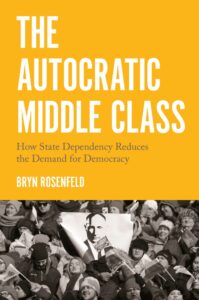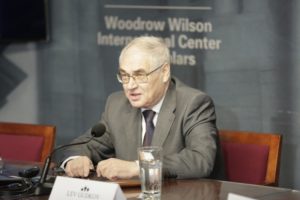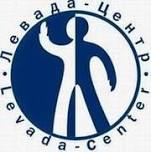 The “slow but perceptible rise of Russian civil society” combined with the gradual contraction of the pro-regime majority presents a challenge to the Kremlin, say two leading analysts.
The “slow but perceptible rise of Russian civil society” combined with the gradual contraction of the pro-regime majority presents a challenge to the Kremlin, say two leading analysts.
But the conventional wisdom that prosperity strengthens the middle class which eventually paves the way for democracy is being questioned by a new study of post-Soviet states.
The recent protests in Khabarovsk reveal the slow but perceptible rise of Russian civil society. according to Andrei Kolesnikov, a senior fellow at the Carnegie Moscow Center, and Denis Volkov, deputy director at the Levada Center in Moscow. Putin’s majority mostly makes itself visible at the ballot box. Absent such mobilization, according to Lev Gudkov (below), director of the Levada Center, only 30–35 percent of the public backs Putin, with roughly half of them being firm supporters. The regime’s opponents make up 10–15 percent of the population. The rest—50–55 percent of the population—are essentially politically indifferent, they add:
The slow contraction of the pro-regime majority is accompanied by the rise of social activism. This represents another challenge to the Kremlin. …Russia’s civil society is developing a new agenda. Its main goal is upholding various rights that are being violated, including environmental, social, and electoral rights. This is not an organized movement in support of human rights, nor is it political, but it is a challenge to the authorities, nonetheless.

Lev Gudkov, director of the Levada Center. Credit: Wilson Center
Recent amendments to Russia’s constitution reflect the political and economic changes that have taken place during President Vladimir Putin’s 20-year rule. Above all, they abolish the fundamental constitutional principle of power rotation, and fix the institutional framework of what is now a mature authoritarian state, argues Kolesnikov.
Had Russia’s domestic political opposition chosen protection of the 1993 constitution as its slogan last summer, it would have been acting in the Soviet dissident tradition of calling for compliance with the Potemkin constitution. Unfortunately, the opposition did not take the constitution seriously either, and thus simply ignored the Putin regime’s abuse of the Russian state’s legal foundations, he writes for Project Syndicate.
In observing Russia and other post-Soviet countries, Cornell’s Bryn Rosenfeld notes that authoritarianism – not democracy – is deepening in these countries despite impressive economic growth and a growing middle class. Her new book, “The Autocratic Middle Class: How State Dependency Reduces the Demand for Democracy” challenges a basic tenet of democratization theory, the Cornell Chronicle’s Kate Blackwood writes:

Levada
Rosenfeld argues that when governments pursue top-down strategies of economic modernization, the middle class overwhelmingly owes its upward mobility to the state and is left dependent on the regime for prosperity. This middle class, she said, is hesitant to embrace democracy, and benefits from autocratic stability. Rather than demand political reform and the protection of individual rights, the autocratic middle class seeks to protect its own position and privileges, she said.
The vast majority of the Russian population remains paternalist and conservative, say Kolesnikov and Volkov. The authorities play on that and present voters with a wide array of domestic and external threats that the state is supposedly protecting them from, they write for Carnegie:
This is likely to resonate with the public. Most Russians continue to place their trust in three key institutions above all others: the army, the president, and the FSB (the Federal Security Service) and other security services, in that order. By contrast, democratic institutions such as the State Duma, political parties, and the media, which have been essentially hollowed out in recent years, are largely discredited. They enjoy very low levels of trust among average Russians.
Putin’s Constitutional Autocracy by Andrei Kolesnikov @ProSyn https://t.co/z2MycQeTTB
— Democracy Digest (@demdigest) December 9, 2020
“In Eastern Europe and the former Soviet Union, the collapse of communism inaugurated a period of market reforms, promising social transformation, prosperity, and democracy,” Rosenfeld writes. “The growth of a new, market-based middle class was widely expected to buttress these twin economic and political transitions.”
But 30 years after the collapse of communism, large parts of the middle class remain heavily reliant on the state. “In Russia, for example,” she adds, “many people who were liberals in the 1990s are now state-employed and supporters of Putinism, or otherwise reluctant to oppose the regime.”
Middle class actually enables autocrats in post-Soviet countries | Cornell Chronicle https://t.co/MuI18dYEH0 via @AddThis
— Democracy Digest (@demdigest) December 7, 2020







